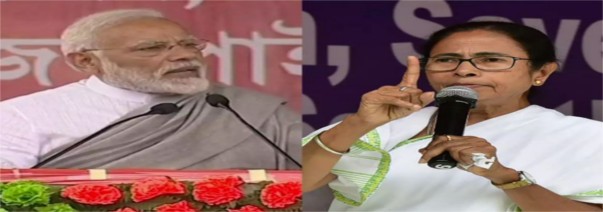
West Bengal Chief Minister Mamata Banerjee sure is rattled.
Ever since a BJP banking on communal polarisation, unemployment and the distaste towards Trinamool’s muscle power politics swept 18 out of 42 Lok Sabha seats, Didi has been scouting for ways to regain absolute command.
Her immediate answer has been controversial to say the least. She has raked up linguistic nationalism, considered divisive by many.
During the junior doctors' protest, Mamata, evoking Bengali pride, said, "If you're coming to Bengal, you have to speak in Bangla. We will not allow people coming from outside to beat up Bengalis."
Her statement came in the wake of the May 15 pre-poll violence that took place during the then BJP president and now Home Minister Amit Shah's rally. A clash had broken out between the TMC and the BJP which resulted in the vandalism of a 200-year-old Ishwar Chandra Vidyasagar bust in North Kolkata.
Trinamool MPs were quick to pin the blame on BJP for the "desecration" of the bust of Vidyasagar, a revolutionary who is an important part of Bengal's cultural history.
Mamata termed the attack on Vidyasagar an attack on Bengali culture and made it the symbol of pro- Bengal rhetoric.
Her counter sub-nationalism did work in her party's favour as the BJP lost all nine seats in the seventh phase of elections.
However, associating culture and linguistics with politics may not yield dividends for Mamata.
Mamata's language diktat makes little sense. Bengal is home to not only Bengalis but an array of people who come from different parts of the country and abroad. Moreover, there is a dearth of employment in the city so when we move out, we need to communicate in Hindi or English. How can she impose a language on free willing people," says Chitrak Dutta, a 24-year-old student.
His protest has a precedent.
Former CM Buddhadeb Bhattacharya in early 2000 issued an order to introduce Bangla in government offices. Bhattacharya later had to face the ire of lawyers when he tried to make Bangla the official language in the Calcutta High Court.
The non-Bengali community of roughly 13 million people, a major vote bank for the BJP, is also infuriated by the chief minister's comment.
"The chief minister has gone awry. How can she dictate someone to use a particular language when she has been against Centre's language imposition. We are not outsiders. My family has been living here for over five decades" says Sashi Mehra, a trader.
Mamata's pitch is not new -- she has been known for her deep-rooted love for the Bangla language and culture. In 2017, she passed a directive to make Bangla mandatory in government schools till 10th standard.
Change in political narrative
All this comes at a time when political violence has gripped Bengal by the throat. There have been at least 15 deaths of workers from both the political parties in post-poll violence across the state.
Bengal's violent political history can be traced back to the CPM regime. However, to the Left's credit, the state had steered clear of communal violence under them. But it doesn't take much to polarise a state that bore the brunt of communal violence during the partition of India.
It doesn't help that Mamata has often faced flak from the Hindus for appeasing the minorities in the state. The 27 per cent Muslim population remains a solid vote bank for the West Bengal Chief Minister.
Riding high on Mamata's weakness, the BJP tapped precisely into this disgruntled Hindu vote bank.
Perhaps, Bengali nationalism then was the last option left for Mamata.
Shayan Debnath, a shopkeeper, is not swayed.
"She has sidelined us over the years. Her vote bank politics is not working anymore. People are unemployed in the state. It's time for change in Bengal, it's time for the BJP to rule the state," he says.
But there is a section of people living in Bengal that has hailed Mamata's counter to BJP's Hindutva politics.
"Bengali identity should take precedence. We are Bengali first. What's wrong in our CM asking outsiders to speak Bengali? The Marwaris and Biharis are slowly taking over Bengal," said Subir Ghosh, a private school teacher.
Mamata's statement was largely welcomed by Bengali cultural groups like Bangla Pakkha, which has been aggressively promoting the Bengali language on all fronts. These groups with a tremendous social media presence have been trying to influence people and make them aware of their cultural heritage over the past few years.
In the past too, the likes of Emanuel Haque of 'Bangla Bhasa o Prochar Samiti' had tried to bring Bangla to the forefront in the early 2000s. Whether Mamata persists with the gambit and if it will succeed in countering the BJP's Hindu nationalism in the state is something that remains to be seen.


.jpeg)

